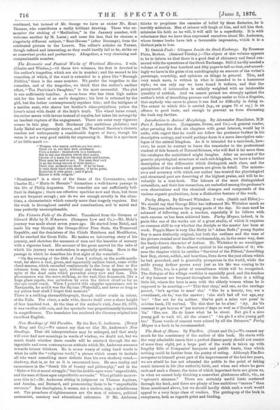The Dramatic and Poetical Works of Westland Marston. 2 vols.
(Chatto and Windus,)--Of these two volumes, the first is devoted to the author's tragedies, which are six in number ; and the second to his comedies, of which, if the word is extended to a piece like "Borough Politics," there is the same number. We prefer the tragedies to the comedies, and of the tragedies, we think that the author's earliest effort, "The Patrician's Daughter," is the most successful. The plot is one sufficiently familiar. A novas how, who has risen high makes suit for the hand of an earl's daughter ; his love is returned by the girl, but the father contemptuously repulses him ; and the intrigues of a maiden aunt, who shares her brother's class-prejudices, poison the lover's mind with doubt of tho lady's truth. The wheel turns round, the suitor meets with favour instead of repulse, but takes his revenge by an insolent rupture of the engagement. There are some very vigorous scenes in this play. Both Mordaunt (the ambitious plebeian) and Lady Mabel are vigorously drawn, and Mr. Westland Marston's rhetoric reaches not unfrequently a considerable degree of force, though his verse is not a very good vehicle for expressing it. Here is a specimen of no little merit :—
.• Women who marry, seldom act but once ; Their lot is, ere they wed, obedience Unto a father; thenceforth to a husband ; But In the one election which they make, Choice of a mate for life and death and heaven, They may be said to act. The man they wed Is as the living record of their deed,— Their one, momentous deed. If he be base, It veils their deed with shame ; if he be great, Encircles it with glory ; and if good, Haloes it with religion."
Strathmore" is a story of the times of the Covenanters, under Charles IL; "Mario de Melanie" dramatises a well-known passage in the life of Philip Augustus. The comedies are not sufficiently bril- liant in dialogue ; there are effective sparkles now and then, but these are not frequent enough ; nor do we see enough novelty in the situa- tions, a characteristic which comedy more than tragedy requires. But the work is throughout careful and conscientious, and in moral and tone perfectly unexceptionable.






























 Previous page
Previous page